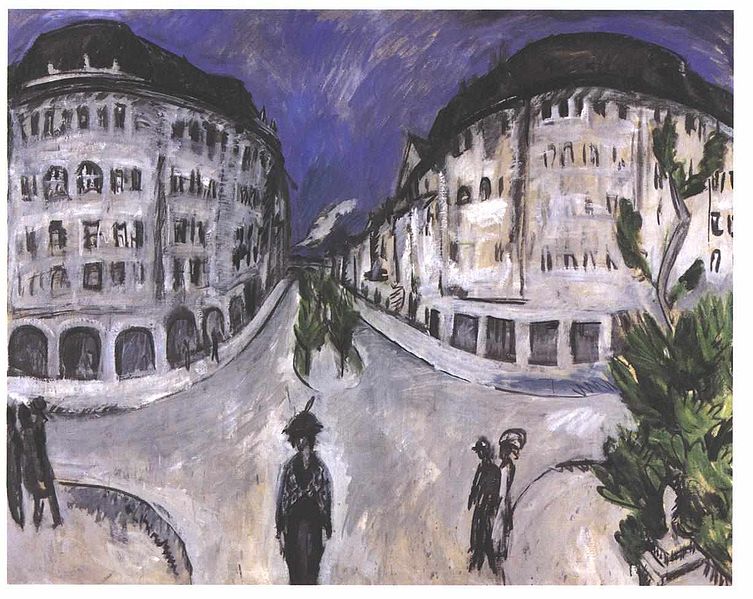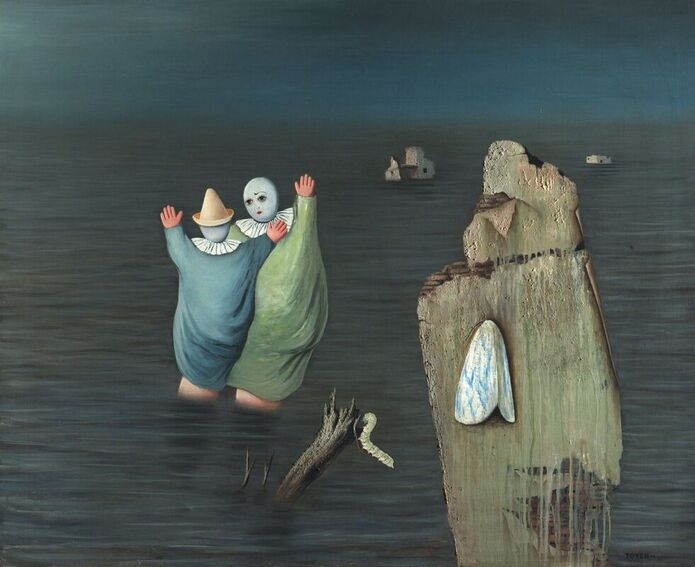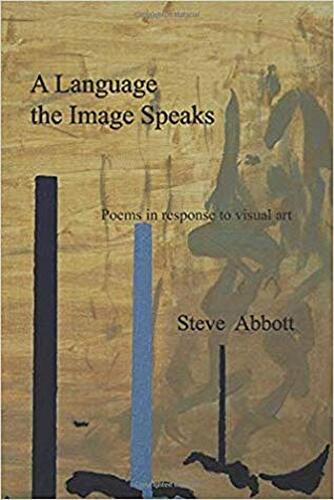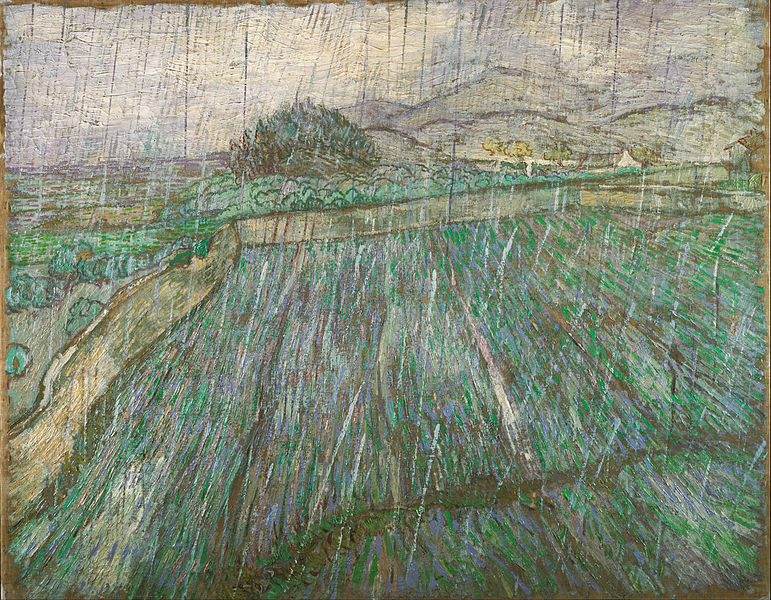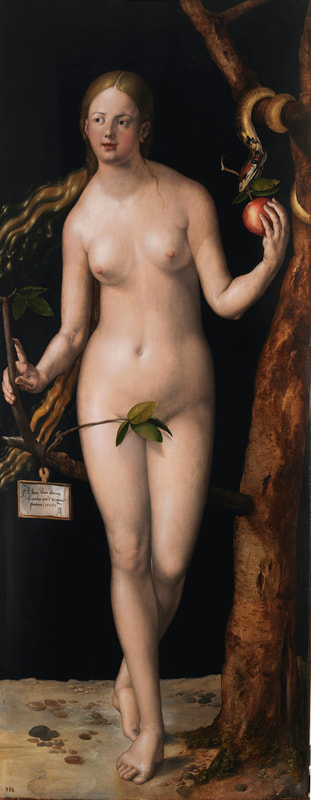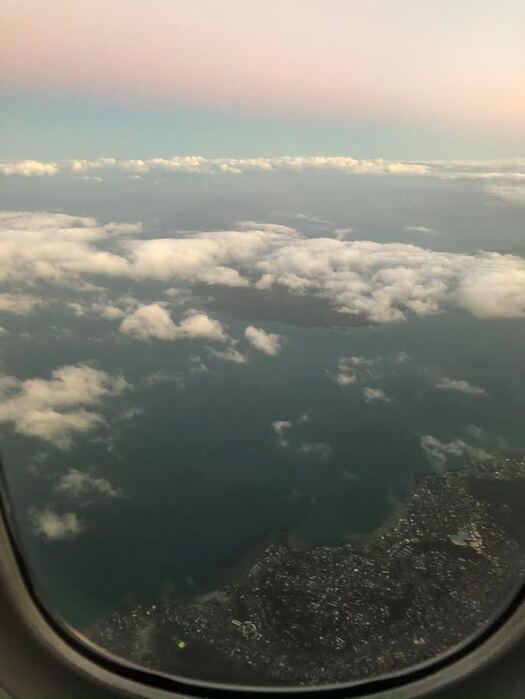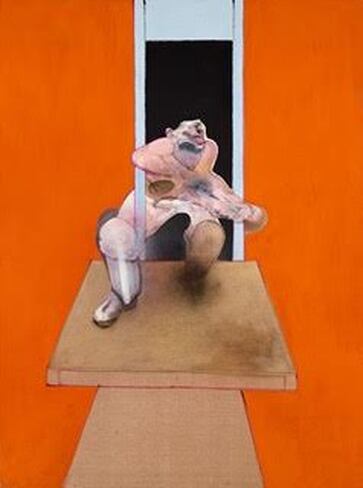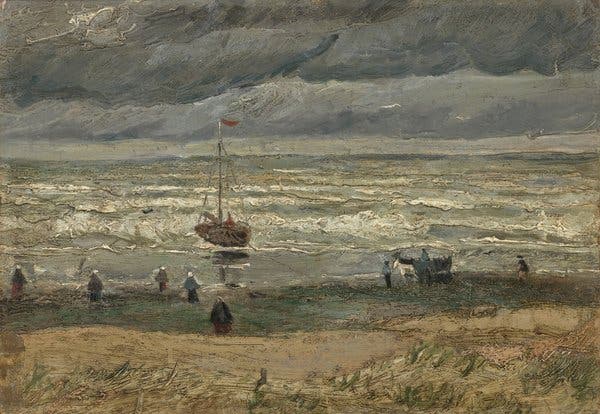|
The Girl in The Plumed Hat Ernst and I were friends even though he considered me naïve and superficial. I didn’t share his brooding vision, but I could make him laugh. I thought him unkind when he revealed the painting, the way he cut off my legs, made me a paper doll. He chose our favorite street off the Stadtpark to express his story, blended lines of colored lies to tell his truth. Urban life was our métier. We loved the stimulation, the rhythms and challenges of the new. Why do you drape the street in ghastly funereal hues? Ernest’s response was a shrug. The curved facades of buildings no longer framed the public space. They loomed and towered over the shade trees, tilted like some malign presence.” But the worst thing about his picture—the disgraceful way he painted over the windows—the vibrant and resplendent windows, alive with the bustle of the street, flash of children playing in the park. In shrouding those mirrors, he buried our reflections. We lost our friendship over this painting. I wish now I had asked more questions, acknowledged my foreboding but I feared anything that would upset my comfortable world. He had erased everything we loved, had made me a mannequin. How right he was to paint me without eyes. Mary Jo Balistreri Mary Jo has three full length books of poetry and one chapbook. She was a musician most of her life but due to the death of a grandchild and a consequent loss of her hearing, she turned to poetry. Mary Jo has always been interested in art and received her BA in art from the U. of Pennsylvania. Please visit her at maryjobalistreripoet.com. She lives in Wisconsin.
0 Comments
Please consider a gift to The Ekphrastic Review. My sincere thanks to all of you who have gifted us. You help promote ekphrastic literature and help keep us publishing amazing writers. Maintaining the Review, reading submissions, responding, editing, seeking artwork permissions, coordinating posts, and running the challenges currently takes 60 to 80 volunteer hours a month- NOT counting the voluntary time spent by guest editors and committee or social media members helping promote the journal, run the challenges, and read for prize nominations. The Ekphrastic Review is free and disdains the idea of taking reading fees or submission fees. If you love what we do, please support us with a one time gift, small or large. You can click here to easily send $5 or any other amount. The never used $1000 button has one purpose only- if someone decides on a huge gift like this, its entire sum will be used to create the first Ekphrastic Review print anthology! Don't hesitate to contact [email protected] if you prefer another gifting method such as a cheque. THANK YOU. We hope to continue to publish and promote ekphrastic talent forever. Editor's Note: If you're just finding us now, wonderful! This is a great place to land, on one of our biweekly challenge response posts. Every other week, dozens or even hundreds of us write to a curated art prompt. Writers submit their best, mostly poems, but sometimes short stories or essays, and we publish a selection. It is always fascinating to see many different interpretations of an artwork, and to see where impressions and narratives overlap and diverge. Some of our writers are Ivy League stars of academia with umpteen books and awards, and others are writing for their first time. Join us! You can find the current challenge by clicking here. The prompt changes every two weeks. Here are the selected responses for the Toyen prompt. We had a record number of submissions for this fascinating artwork. Here are some creative takes on it. Best wishes, Lorette ** Indispensable Lessons (for George, Nikolaos, Patsiaouras & Nabila) 1. It’s an age-old dictum: it’s foolish to build sand-castles at the seashores. Unless temporary-pleasures are the obsessions. (Well, that’s what the prophets of ephemerality will have you believe anyway.) 2. Memory is the Akashic Register.* Unlike many things, it isn’t so evanescent, after all. Provided the sand is not the scribe, and its rooms are not made of wood. Unless it is a burden that you would rather you didn’t laden the beast with. 3. Yes, life doesn’t abide by the laws of stillness. But not every caterpillar eventually emerges with wings. Unless the wings are merely a matter of aesthetics. 4. Yes, to be able to swim is perhaps an intriguing capacity. But not all waters can be reached without boats and oars. Unless familiarity and not exploration is only the mission. 5. To keep the face, one ought to keep the word. To keep a friend, one ought not to be judgemental. Unless hypocrisy is what the doctor ordered. (And of late, this happens to be everyone’s favourite prescription.) 6. Distances cannot be overcome without traveling. And not all journeys are to be embarked upon without all the essential paraphernalia. Unless merely wandering and not learning is the sanctioned commission. 7. Yes, possessing perceptions is necessary to fashion a/ny sense of self. But disillusionment is not to be had until the ‘I’ is constantly regulated. Unless the window dressing with manikins is the norm. (And apparently, ‘I’ has been The Messiah for who knows how long.) 8. Theatre is The Home to an/y artist. Yes, a play without costumes is, but a harp without melodies. But not every script is capable of metamorphosing into a play, and not every performer in a costume is an artist. Unless the idea is to only fill up the premises with any audience. Saad Ali *The word ‘akash’ is from the Sanskrit language, which means ‘sky’ or ‘ether’. The Akashic Register/Records, according to the ancient Hindu mythology, is a realm in space, which keeps a register of all (human) occurrences i.e. events—that have happened, are happening, and will be happening. Saad Ali was born in Okara, Pakistan in 1980 C.E. He has been brought up in the UK and Pakistan. He holds a BSc and MSc in Management from the University of Leicester, UK. He is an existential philosopher-poet, and has published two books of poems (so far) i.e. Ephemeral Echoes (2018) and Metamorphoses: Poetic Discourses (2019). By profession, he is a lecturer, consultant and trainer/mentor. Some of his influences include: Vyasa, Homer, Ovid, Attar, Rumi, Nietzsche, and Tagore. He is fond of the Chinese, Greek and Arabic cuisine. He likes travelling by train and exploring cities on foot. ** Drowning is a State of Mind Only a clown would tolerate a singular response to a watery grave. Raise your eyebrow and your hat in collusion consent and join the moth, there’s no harm in hawking your humanity, after all, everyone does it. Puppetry is the new political norm, so, trust the squall above the sea, and eat your words, if you need to keep your head above the water. Susan Howard Susan Howard lives in a small community north of Auckland. She writes about what affects her and sometimes the world stage. She has been published in NZ most recently in Takahē Magazine and overseas in The Blue Nib Review, and the online Shot Glass Journal. ** Embrace and Exit My hands are dying too far from home, from everyone they would hold. More specifically, drowning, sinking with the rest of this suddenly heavy, tired body. More importantly, murdering the characters they've created, erasing laugh lines and tears. The audience, silent, looks on, waiting for the water to rise and drop their own final curtain. Lennart Lundh Lennart Lundh is a poet, short-fictionist, historian, and photographer. His work has appeared internationally since 1965. ** Suspending the Surreal Tickets are cheap at the Potato Theatre. The stage, dark as a moonless midnight. The plot, indecipherable as Linear B (used to be). The actors as inscrutable as Buddhas. A moth clings to a wooden pier, rotting before my eyes, and I suspend disbelief. A familiar dread conjures up my dreamer’s dark tangle of personalities. Am I caterpillar, dangling on the branch of a sunken tree, or the transformed moth? Perhaps the white-faced Pierrot with androgynous expression-- sad, soft, almost tender—for the blue and green bodies, each rising on a leg as sturdy as a telephone pole. Or are we a three-handed, two-legged chimera, shape-shifted, commanding stage left. Behind us, whitewashed buildings call out Home. Home. How tempted I am to swim out to them before they sink into the theatre’s darkness where the sole member of the audience, I am trapped in inescapable images. Sandi Stromberg Sandi Stromberg continues to thrive on The Ekphrastic Review challenges, coupling her love of poetry and art. She has published in many small journals and anthologies and edited two poetry anthologies. For ten years, she served on the board of Mutabilis Press (a poetry press in Houston, Texas). She has been a juried poet in the Houston Poetry Fest eleven times and published translations of Dutch poetry in The Netherlands, Luxembourg, and the United States. ** Book I open my mind like a bound of pages. My eyes enter the gray flow, water’s insistence of shades. I pick up yesterday’s discussion with absence, dual as as today’s lucid light. It isn’t strange for harmony to background, story’s artificial time itself the measure that prevents everything from happening at the same time. I’m not writing so much as living as I write, scenes not so much spaces as places. I interrogate myself like the distant house, transfer the conversation to the clowns after the moth refuses the caterpillar. Jonel Abellanosa Jonel Abellanosa lives in Cebu City, the Philippines. He is a nature lover, an environmental advocate, and loves all animals particularly dogs. His poetry collections include, Meditations (Alien Buddha Press), Songs from My Mind’s Tree and Multiverse (Clare Songbirds Publishing House), 50 Acrostic Poems, (Cyberwit, India), In the Donald’s Time (Poetic Justice Books and Art), and his speculative poetry collection, Pan’s Saxophone (Weasel Press). He loves to self-study the sciences. Previously published in The Ekphrastic Review, he has consistently interrogated ekphrasis as a important form in his poetic writings. ** On Potato Theatre, by Toyen Do not define me by the waters that surround us, nor the hidden face behind folded wings. I dance with my liquid self, ever becoming, ever sinking, ever rising. Free to bend my knees beneath your weight, to sigh, to moan the world’s undoing, I navigate desire and sail through your illusions In the manner of my choosing. K. M. Huber K. M. Huber’s work is colored by growing up in the USA’s Pacific Northwest, a decade in NYC, and many years living in South America. A Pushcart nominee, her work has appeared in Earth Island Journal, Diner, McGuffin, Post Road, and ViceVersa among others. She has recently moved to Tennessee with her Peruvian husband and her novel of sixth-century Nazca is looking for a home. ** Preamble The tide moves out on loss and this is what remains of our inconceivable lot: two grey incomplete silhouettes dancing face-to-face with a pompous uncouth truth. Puppets to love’s charade, masks magnanimous on phantom selves; souls, sold. The present a fated farce, cringe-told, future a sinking, sunken house. While a moth hibernates in the wreck of a story and a worm turns in the dirt and a caterpillar of a dream hangs precariously on for dear, doggerel life and somewhere a turntable of despair chimes a tune of nonchalance and dancing, we flit upon the ennui of it all - dancing into the grey oblivion disengage from sweet irreverence, days ebbing and drifting, reality a hop and a skip and a dirge… getting further and further away. Siobhán Mc Laughlin Siobhán Mc Laughlin is an avid poetry lover. Her work has been published on Poetry 24. Siobhán shares her love of poetry on www.a-poem-a-day-project.blogspot.com and Twitter @siobhan347 ** When You Lose Your Mooring What remains is the concrete ship at Sunset Beach stranded at low tide, left as dock when it went aground. You dream of staterooms in the hull where you can live and swim out of the hole in its side surface at night when the ferry departs bound for Lewes and a reef that protects what the harbour does not. Tops of water skis are draped in colors of the bay faded in an August sun. Keep the tips upright so when the outboard roars away you will not pitch headfirst into the debris of whalers’ shacks everyone thinks long gone except porpoises that follow in your wake as you glide over the top of each wave building its curl scattered with diamonds. The only other way out of town exists in memory because the sweep of lighthouse brings you home every time you’ve drifted too far. Kyle Laws Kyle Laws is based out of the Arts Alliance Studios Community in Pueblo, CO where she directs Line/Circle: Women Poets in Performance. Her collections include Ride the Pink Horse (Stubborn Mule Press, 2019), Faces of Fishing Creek (Middle Creek Publishing, 2018), This Town: Poems of Correspondence with Jared Smith (Liquid Light Press, 2017), So Bright to Blind (Five Oaks Press, 2015), and Wildwood (Lummox Press, 2014). With eight nominations for a Pushcart Prize, her poems and essays have appeared in magazines and anthologies in the U.S., U.K., Canada, and Germany. She is the editor and publisher of Casa de Cinco Hermanas Press. ** Potato Theatre Waltz Beaten sailor’s posture – frozen jelly-baby, tempus stuck charmless strangers dance – Hop – Skip – Hop – and Hold… frenzied behind bland masks – eyes glassy, pupils hidden lifeless, exuberant screams dive into the water and smile and beneath dead sailors wait, like broken china pots, given as gifts as slithers of icy foam-covered plankton, we hear the finger-puppets sway above the grime watered cloth, a deaths mask, take a paddle in the Styx, waltz into Hades and beyond – hop – skip – hop – and hold. Zac Thraves Zac Thraves is a writer and performer in Kent; poems have been published with various magazines and stories have been performed throughout the county. You can find some work on Instagram and join him on Twitter. ** A Meeting Of Artificialism in this purple haze of artificialism no sea horses or tidal wash we citizens face to face each other arms above water embracing as faux friends haven’t done so since early days in vaudeville, the memories of mystic music insatiable mime contriving rampant surrealism without moving slender lips we dialogue with duplicity drawing power from the abstract inherent in our elicit past through circus green smocks when close by a white worm from a dead root escapes capture as a metaphor for Miró’s subconscious sandbox always alert to ambiguity far from blighted potato fields with enduring properties of transience fixate on a mirage of abject tranquility in this oasis of culture yet in a moment, we’ll be gone departing forever drenched from the trauma engrossed by the spirit in the purple haze of artificialism Alun Robert Alun Robert is a prolific creator of lyrical verse. Of late, he has achieved success in poetry competitions and featured in international literary magazines, anthologies and on the web. He particularly enjoys ekphrastic challenges. In 2019, he was a Featured Writer of the Federation of Writers Scotland. ** Hail and Farewell We greet each other, hailing without hug rising up through the murky gray mire of ourselves. Am I the green? Are you the blue? Clowning about, true hands covered. Rocks watch us, cracking, open mouths laughing at our antics. Only the moth, resting on a jetty’s stone remains and the naked inchworm slinging to the floating branch dare to bare true colours. The rest of us wear masks going about supported by, propelled and puppeted through these murky waters. We hail one another, hoping that by recognizing our essence, beneath the clown masks, we will, indeed, fare well. Joan Leotta Joan Leotta plays with words on page and stage. Her work has appeared often in The Ekphrastic Review. She loves interpreting art with other forms of art. Other journals that have given home to her poems include When Women Write, Peacock Review, Silver Birch, anti-Heroin chic, Hobocamp Review and others. Her essays and articles are also widely published. On stage she tells folk and personal tales of food, family, and strong women. Walking the beach, cooking, and spending time with her daughter and husband are among her favourite things to do. ** The Erotica Inside Me Does Not Quiet like an alarm clock that keeps melting but never stops. The sea is gentle enough to dance with you even though hair on my only leg does not find much tide, or is it the calm before we are assassinated by war? We did not deserve this pleasure as if we found both halves of unmated wolves. Yet I am not a predator. Behind this suit I masquerade more like a clown. When your wet hip invades my hip, we begin to wade in the sound of a saxophone. Hands float across a piano, and then the wind begins its tender assault. I smell the sex of you. Underneath your hat is vanilla followed by salt, which is somehow dusted off at your neck by cinnamon. No, not wolves. Instead my body is a funny potato with less skin, and you blossom like a grapefruit split open. I want to sip a little bit of your juice maybe commit enough sin to curl your toes. Love is the only thing to be killed by. We are pawns of this light that melts us, and the theatre must go on and on.... John Milkereit John Milkereit is a mechanical engineer working in the oil & gas industry who lives in Houston, TX. His poems have appeared in various literary journals including The Ekphrastic Review, San Pedro River Review, and The Ocotillo Review. He completed a M.F.A. in Creative Writing at the Rainier Writing Workshop in Tacoma, WA in 2016. His most recent collection of poems, Drive the World in a Taxicab, was published by Lamar University Press. ** War At the outset, we say we’ll be brave, We say we’ll survive. We promise ourselves quick victory like we’re playing at the World Cup. But it’s never Us vs. Them. Fear, grief, hatred, and hunger attack from within. In a few months, I’ll do anything. ANYTHING for a bowl of soup, loaf of bread, safe bed. Every day I hear boots on the stair, bombs whistling overhead – hallucinations. I’m drowning in my imagination. I’m afraid to look in the mirror, suspect I’ll see both body and soul already split apart and waving surrender. Alarie Tennille Alarie Tennille graduated from the University of Virginia in the first class admitting women. She’s now lived more than half her life in Kansas City, where she serves on the Emeritus Board of The Writers Place. Her latest poetry book, Waking on the Moon, contains many poems first published by The Ekphrastic Review. Please visit her at alariepoet.com. ** The Romance of Pomme de Terre and Patates Douces I can't explain myself, because I'm not my self you see. Alice, "Alice In Wonderland" Before we met, I was the caterpillar who could not spin its chrysalis, the Blue-Wing moth that clings to wood that's turning into driftwood -- a poem made of driftwood words that wears a sea-net like a bridal veil. Something in you made me child-like; perhaps it was your innocence, sleeping in the bathtub, in darkness, so our lives became a dream, surreal. Hiding from the Nazis, we were hidden within one another.... The bathtub held the ocean; and sometime in the night, the potato field outside a village was flooded. I was the womb for all my painted characters, my theatre absurd. Time was Dali's clock face, and when you were Heisler, the world was sometimes kitsch. Your dioramas came to life when I was Toyen. We were Two when everything was Two's: Mr. and Mrs. Potato Head, Romeo and Juliet, Pierrot and Columbine, Pomme de Terre and Patates Douces. Now, without you, the curtain in the Potato Theatre opens to a plant pathologist, a widower, and his daughter, Columbina, who has just opened a birthday box from Potato Pals and found, nestled in royal purple paper like Valentine chocolates, six seed potatoes. It is not by accident that I have given Columbina the same name as one of the seeds. Do you see now we are meant to be in the scheme of things, living, dying, living again? Columbina rushes to get a glass container recommended by Mr. Wizard on her retro black and white 1950s kitsch television encased in lime-green to remind her of the earth -- new leaves and potato flowers like blue stars, filling the field, sweet potatoes with flowers like morning glories. Columbina has worn a potato flower crown onstage in a revolutionary play. Her father, watching, had to take off his glasses and wipe his eyes, thinking of Columbina's mother, their last trip before the fields flooded; a trip to discover the origins of potatoes in Peru. Columbina puts Pierrot in water, in the clear glass jar so she can watch his roots grow. She counts his eyes -- so many, like the eyes of Argus watching Io, a Blue-Wing. Mr. Wizard never mentioned ears, but Mr. & Mrs. Potato Head have ears, so she settles herself in her bedroom with her potato-faced dog stuffed with potato skins dried in sunlight so he crunches like potato chips as she begins to tell Pierrot, his seed in glass, the Romance of Pomme de Terre and Patates Douces. Pomme de Terre was your nom de plume, Heisler, the way you signed love letters to your Patates Douces, such erotica! and I was exotic, imported, your mail order bride. Our world was shaped like a potato, so everything was lopsided except the way we loved each other in darkness, hidden in one another, insulating one another from the haunting danger we could not change in any way other than to find the light within ourselves, within our art, laughing at ourselves when we were as ridiculous as Columbina telling Pierrot a bedtime story to make him grow. In our Potato Theatre, we had many disguises so we'd be unrecognized: Pierrot was once the son of a poor potato farmer. He went to the Baker's Shop because you were brave and I was hungry. You carried two of Columbina's seeds to exchange for a baguette. The baker, a giant, scoffed at you and the potato seeds -- "2 reichsmarks or I'll put you on the loaf paddle and tan your hide in the oven!" Fire was rushing from the oven, but you stepped forward and set one of the seeds on the dirty floor, pressed it with your foot as your father had told you to do, and said the magic words Columbina learned from Mr. Wizard: "Pierrot loves Columbina. Pierrot loves Columbina." And like a surrealistic fairy tale we invented to save our lives, a potato stalk began to grow in the baker's shop, growing up and up until it burst through the roof, up and up until it reached the sky and exploded a black cloud so it began to rain. It rained and rained until the village flooded, and the potato field outside the village flooded, and all the shops -- the butcher's, the baker's and the candlestick maker's -- all floated, carried away by high water into the Potato Theatre... Columbina paused in the story she was telling Pierrot, who was growing quietly in the jar as his eyes grew little shoots that looked like tears. She could hear her father on the telephone in his laboratory, walls covered with plant pictures, leaves spotted and wilted; and a picture of her mother, gathering potato specimens in the sunlight before she was drowned in a flash flood. Her father is upset, talking to the head of pathology -- "Once it starts flooding, we'll have to do all of it -- all of it! -- all over again!" Columbina sighed -- the boy was still saying "Columbina loves Pierrot! Columbina loves Pierrot!" as he floated into the field. And do you remember how it all ends? Potato roots tangled with seaweed, my legs, two stalks growing from the mud in the potato field, my hands holding Pierrot and Columbina above the water, Pomme de Terre taking me in his arms, waking me in high water so I dropped my paint brush. Pierrot's hands were reaching for Columbina/Columbina reached upward; and it seemed, in a moment, that they were dancing in dark water, reaching for the sky, the way that I loved living with you when the Blue-Wing learned to fly Laurie Newendorp Laurie Newendorp's new book, When Dreams Were Poems, includes poems published by The Ekphrastic Review; and "Entering," a poem that won second place in the Ekphrastic Contest, Houston Poetry Fest, 2018. She is forever romantic, and could imagine the weight of anti-semitism for the Czech Surrealists, Toyen and her Jewish lover, Heisler, living in Prague during the Occupation. Her recent work, for Words & Art, "Black Rhapsody 2020," celebrates the life of Dr. Martin Luther King. A Language the Image Speaks: Poems in Response to Visual Art by Steve Abbott This is one of the best books of poetry I’ve read this year because the poems—excellent, solid, many positively brilliant—are all wonderful and that’s just the start of it. Well, start and end of it. In between, Abbott has achieved what online journals, such as The Ekphrastic Review, but very few print anthologies have achieved, which is to say, a book of ekphrastic poems accompanied by gorgeous, vivid, full-page copies of the related artworks, mostly paintings in this book, also photographs and sculptures. Before I discuss what a tour de force the book is as a whole, I want to say a word about the words, which Abbott has been smithing a long time. He is a terrific poet with six previous poetry collections, as well as of poems in many journals, including two poems published in this review. (You can do so here: “Albino Sword Swallower at a Carnival” and “Morning Sun.”) His poems in this volume are varied in subject, shape on the page, sound play, tone, and syntax, that latter ranging from the fragmentary of his haiku: The forest clearing morning fog-- my golden blanket (from "Four Haiku" after Something Happened, a painting by Jo Dickinson) to sentences that pull the reader along to reach their end: …This expanse is a canvas of long shadows spare minutes of sun unroll across a cold world. (from “Blue Light” after The Battery, a painting by George Bellows) The poems range from the humorous: “The drummer’s parents weren’t quite serious/when they complained my bass guitar was loosening/copper fittings in the pipes….” (“Triphammer”) to this satiric commentary on Father Coughlin: The answer, of course, is simple: They are not like us, Our Heritage And faith and flag. Not like Us, who understand the real danger the loss of rightful place, above Them with their odd odors and leather skins, over there…. (“At the Leading Candidate’s Rally”) And there is sweet personal tenderness, as in these closing lines based on a photograph: These edges that blend line and light, obscuring where the borders are and what it is that crosses them now, and in the night, in my heart, silently, like a cloud. (“Lost Cloud”) While the poems tend to free verse, they exhibit a great variety of form, from regular two and three line stanzas to solid singular blocks to fragments splayed margin to margin so that, in a way, the poems are as pictographic as the works on their facing pages and skillfully full of sound play: Against the wall, out of the wind, a broken crate makes a table. Simple, stable, like the men holding the cards, the men who move only when the cards move. (from “Frenchmen Playing Cards”) Certainly a good ekphrastic poem can stand alone without illustration from its impetus, but I love it when the art accompanies the poem, and it is difficult, expensive, and time-consuming to obtain rights, and find the right printer for the job. The few ekphrastic print collections I’ve seen have been anthologies and often of contemporary art only, or art old enough to be in the public domain. However, the the art in Abbott’s collection is as wide ranging as his writing style, from the classical mid-18th century painting by Jean-Marc Nattier, to modern classics by Louise Nevelson, Edward Hopper, Elijah Pierce, and George Bellows, to contemporary works by living artists around the U.S. and the world, including Abbott’s hometown of Columbus, Ohio. The subject matter of the art and poems ranges from the political (a painting on the French Revolution as well as a photograph of white nationalists in 2017) to the descriptive of nature, architecture, scenes, people, and music, to the contemporary design of a puzzle box lid (“Jigsaw”) and a playing card (“Queen of Spades”). The last ten pages of the book exhibit the yeoman’s work that Abbott put into the collection beyond writing the poems, including his notes on the paintings and bios on the artists. It also lists agencies and individuals who helped with the permissions and with the financial costs of such a book, an example of patronage in the best sense of the word. As I read the book, I thought of Simonides’ words: “Poetry is painting with the gift of speech,” because in these poems, painting and related arts have definitely found the supreme speaker and maker in Steve Abbott’s A Language the Image Speaks. Diane Kendig Diane Kendig’s most recent poetry collection is Prison Terms, and she co-edited the anthology, In the Company of Russell Atkins. Her poetry and prose has appeared in journals such as J Journal, Under the Sun, and Blueline, and she curates, “Read + Write: 30 Days of Poetry,” now in its sixth year with over 2200 subscribers. A Language the Image Speaks: Poems in Response to Visual Art by Steve Abbott 11th Hour Press, 2019 Click here to view or purchase at Amazon. Wheat Field in Rain Rain assaults the window panes. It pelts the scene, it comes from clouds that hover in some luminous way above the blue-gray distant hills on this translucent, tinctured day. The field spreads out before his eyes in shades of green, in blurry rows. A road meanders round the wheat, the quilted fields, those darker trees. Rain shears the air in stylized lines. He paints his beads of mournful tears from inside out, from inside out. Bonnie Naradzay Bonnie Naradzay: "Recent poems are in New Letters (Pushcart nomination), RHINO, Tampa Review, EPOCH, Tar River Poetry, Poet Lore, Anglican Theological Review, Seminary Ridge Review, The Xavier Review, The Ekphrastic Review, Passager, and other places; a poem will be published in the Kenyon Review Online. I earned an MA in English literature from Harvard University (which included my taking the course “The King James Bible as English Literature,” taught by Robert Lowell). I lead poetry workshops at a day shelter for homeless people (Miriam’s Kitchen), and at a retirement centre (Ingleside), both in Washington DC. In 2010, I was awarded the University of New Orleans MFA Program’s Poetry Prize: a month’s stay in the castle of Ezra Pound’s daughter, Mary, in northern Italy. While there, I enjoyed having tea with Mary, hearing cuckoos call out during mating season, and hiking in the Dolomites. More recently, in 2017 I earned a master’s degree in liberal arts at St. John’s College in Annapolis." Swimming Lesson It is a late June lesson. The sky threatens. And so do five-year-olds. Sobs, cries, all-out wails. Fear as palpable as the muggy, noon-day heat. The instructor, like a merciless Natzi, calls you to the deep. Chin down! Arms out front! Like Superman! Don’t fight it! You edge forward, shivering, shoulders as hunched as grackles’ wings. You can do this! The water is strong and will hold you up. Glue-footed you are. Tentative. Panic painting your tiny frame. Jump! Now! Right now! I said now! You fill your lungs and lunge, breaking the water, stroking toward her as if every drag might be your last. Breathe! Pull! Kick! Breathe! She offers her hand and then shoves you toward the shallow where you emerge for her high-fives and atta boys. See, you have swum the pool’s length. Lips quivering and eyes tear-filled, you inch out of the water, cutting a glance at your mother. All you see is her pride. What you don’t detect are muffled whimpers escaping her very core. A heart flutter-kicking. How well she understands water to be strong, dear son, so strong, in fact, it can bear you up. But she knows it to grow dark and billowing and treacherous and wild. She prays for lifelines, our precious one. She pleads for buoys. Jo Taylor Jo Taylor is a retired, 35-year English teacher from Georgia. Her favorite genre to teach high school students was poetry, and today she dedicates more time to writing it, her major themes focused on family, place, and faith. She says she feels compelled to write, to give testimony to the past and to her heritage. She has been published in The Ekphrastic Review, in Silver Birch Press and in Heart of Flesh Literary Journal. Dürer’s Eve The consequences follow from here: the shine of forbidden knowing the apple soon offered to Adam the twined Serpent’s hidden fangs the omniscient God off elsewhere the enjoined tree gravid with fruit the sun’s half-light off reddish-brown hair the flawless radiant skin the inviting pursed red lips the apple’s crisp ripe roundness the knowing unavoidably to come the pain knowledge will never satisfy the pose of Eve’s determination the sinister temptation in her left hand the arresting essential iconography the coming expulsion to mortality the art’s suspended eternal pause the gentle innocence of her eyes the dark shadowed forest behind her the world becoming musky with death the Divine scheme’s fixity the what-might-have-been the Godhead’s complex rebus the bitten apple later fallen to earth. Ed Higgins Ed Higgins’ poems and short fiction have appeared in various print and online journals including recently: The Ekphrastic Review, CarpeArte Journal, Under the Basho, and Sum Journal, among others. Ed is Professor Emeritus, English Dept. and Writer-in-Residence at George Fox University. He is also Asst. Fiction Editor for Brilliant Flash Fiction. He lives on a small organic farm in Yamhill, OR where he raises a menagerie of animals, including a male whippet, Mr. Toffee, and a rooster named StarTrek. Portal Through imitation glass, an imitation world, removed observer and observed observing real and imagined blur, in chalk-dust atmosphere the velvet sound of blackboard brushes dampened smack detentions glimpsed through glass, imagined freedom tainted puffs of cumulous a hint of pink, a sunset rare on blackened khaki earth, a kiln in stone-fruit summer sky a harvest, cropped, a threaded needle eyelet cinched into a knot, snapped taught with teeth caught somewhere in between a grimace and a smile through imitation glass this imitation world slides by, a curtain drawn in water droplets darkening to ashy grey, to twilight dusk and finally to black Bill Arnott Vancouver author, poet, songwriter Bill Arnott is the bestselling nonfiction author of Wonderful Magical Words and Dromomania. His poetry is in the League of Canadian Poets Heartwood and Paper Dart Press UK PLAY anthologies. Bill’s poems, reviews and articles also appear online. Figure in Movement Emerging? or disappearing? Both and so little time between Hours defined by grey human frame A door? or scaffold? Both and so little space between A grotesque constrained at the point of decision, Canvas bound and bound away from darkness Transfixed I lose balance my mouth lurches open and your raw howl erupts from my belly Jacqui Rozdoba Jacqui Rozdoba: "I studied fine art and English and have worked in various jobs to support a family. During this time, I wrote and stuffed poems at the back of drawers. I am currently renovating a house on the south coast of England and spending more time writing, only lately venturing out from under an imposter’s cloak to share work and exchange ideas with other writers." Letters to Vincent #2 Re: View of the Sea at Schevingen, 1882 Dear Vincent, I once stood on the rocks overlooking a cove on the Central California coast watching the rough waves careen off a jetty, creating a cross current that exacerbated the more direct incoming waves. The resulting synergistic effect magnified the breaking waves, creating unpredictable, violent energy bursts. I see this same dynamic in your early View of the Sea. You caught the power and cross purpose of the waves, the sky, and the land by your rough build-up of underlying texture—a technique you were to deploy later in the south of France. You point out the poetry, and yes, that’s there too! The weight of the boat against the tossing surf, the flag on mast-tip blowing shoreward and the horizon pulling us beyond. You speak to the raw wildness, of the natural world outside, and to our human nature inside. We are layers of light and darkness, of heat and cold, of good and evil, and those layers within us careen about unpredictably. Sometimes they grow out of control. Kendall Johnson Kendall Johnson writes and paints in Upland, California. He is the Director of Gallery 57 Underground, Pomona. Kendall is author of several non-fiction books on psychological crisis and trauma, and four books of poetry: Fragments: An Archeology of Memory; Johnson’s Pasture: Living Place, Living Time; A Whole Lot’a Shakin’: Midcentury Reconsidered: and A Sublime and Tragic Dance, co-authored with John Brantingham about Robert Oppenheimer. Vincent found him years ago and hasn't let go since. |
The Ekphrastic Review
COOKIES/PRIVACY
This site uses cookies to deliver your best navigation experience this time and next. Continuing here means you consent to cookies. Thank you. Join us on Facebook:
July 2024
|
